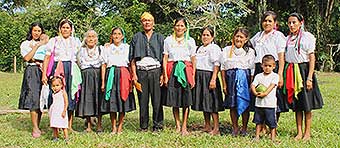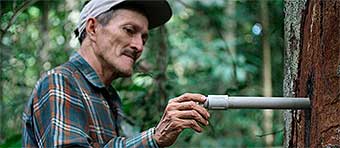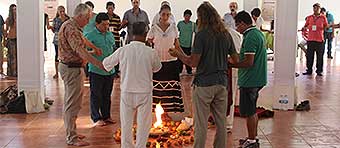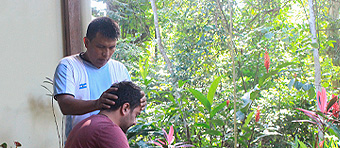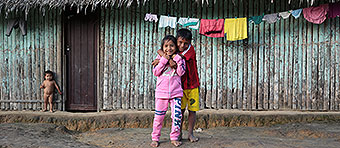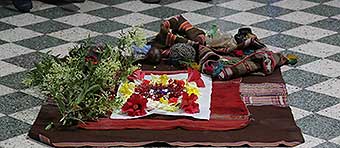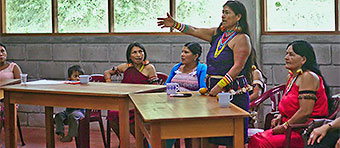Working with indigenous communities
Takiwasi Center develops intervention projects for the benefit of indigenous communities through its Laboratory of Natural Products, which constitutes its business unit and acts as a social enterprise in the field of BioTrade.
In order to produce high quality and added value natural products inspired by the ancestral knowledge of Amazonian Traditional Medicine, Takiwasi Laboratory works with 74 families of agroforestry producers, in 21 indigenous and rural communities, training them in sustainable management of forest resources and guaranteeing them a fair payment for the harvest and care of medicinal plants, while distributing the economic benefits according to gender equality.
Through this strategy of articulation of the value chain of medicinal plants, the work of the Takiwasi Laboratory also promotes the valuation and conservation of 19,655 hectares of Amazonian forest. It also works to ensure that native communities retain control over their ancestral knowledge related to the use of medicinal plants. Since 2006, it has accompanied 180 indigenous therapists in the registration of hundreds of plant-based recipes in the National Registry of Collective Knowledge of Indigenous Peoples of the National Institute for the Defense of Competence and Protection of Intellectual Property - INDECOPI.
An example of this work is the Proyecto Saberes Medicinales Amazónicos(Amazonian Medicinal Knowledge Project): a project aimed to the recovery of knowledge around Amazonian medicinal plants in the Awajún and Quechua-Lamista communities of the San Martín Region.
A close alliance has been put in place with the association of medicinal plant producers "Ampik Sacha". In the framework of this alliance the Takiwasi Center has trained 45 indigenous producers in good manufacturing and management practices, so that they progressively become empowered in productive and commercial management of their own line of natural products. A result of this work is the collection of Amazonian herbal teas Sumak Together with them Takiwasi Laboratory establish production costs, ensuring a fair price and a good net profit for the harvest and care of medicinal and aromatic plants.
From 2015 to 2024, Takiwasi Laboratory, in partnership with the NGO Conservation International, has implemented cooperation projects for the benefit of the Awajún native community of Shampuyacu, focusing especially on the recovery of ancestral knowledge linked to medicinal plants and their uses. In this way, a nine-hectare space known as “Forest of the Nuwas” has become a successful example of the process of recovery of biodiversity and ancestral knowledge. Thanks to this accompaniment, the Nuwas (women) of Shampuyacu have managed to identify and register 227 recipes related to medicinal and aromatic plants. The next step has been to convert this knowledge into a line of aromatic herbal teas with medicinal properties, following a Biotrade approach, and thus guaranteeing a fair price to the community.In this process, Takiwasi has trained the Nuwas through workshops on the procedures for manufacturing and controlling the quality of the herbal teas, while reflecting on how they should be organized within the community and with its allies, to give economic sustainability to this project. Infusiones Nuwa have been launched to the market in December 2020.
The work of the Takiwasi Laboratory is considered pioneer in the implementation of a distribution scheme for the benefits linked to the use of traditional knowledge. This experience has also been mentioned by the United Nations in a specific report published to celebrate the 20 years of the BioTrade initiative. This report compiles the most interesting initiatives in this sector, developed in several countries including Peru, Colombia, Vietnam and Brazil. In section 2.4, page 30 of this document, you can find an article on the work carried out by the Takiwasi Laboratory in conjunction with the indigenous producers' organization Ampik Sacha. Download Publication.
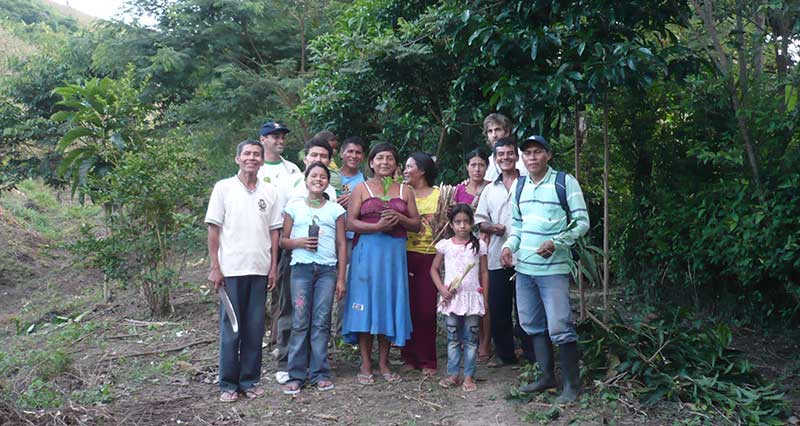
Contact Form
×A confirmation e-mail has been sent to your account.
